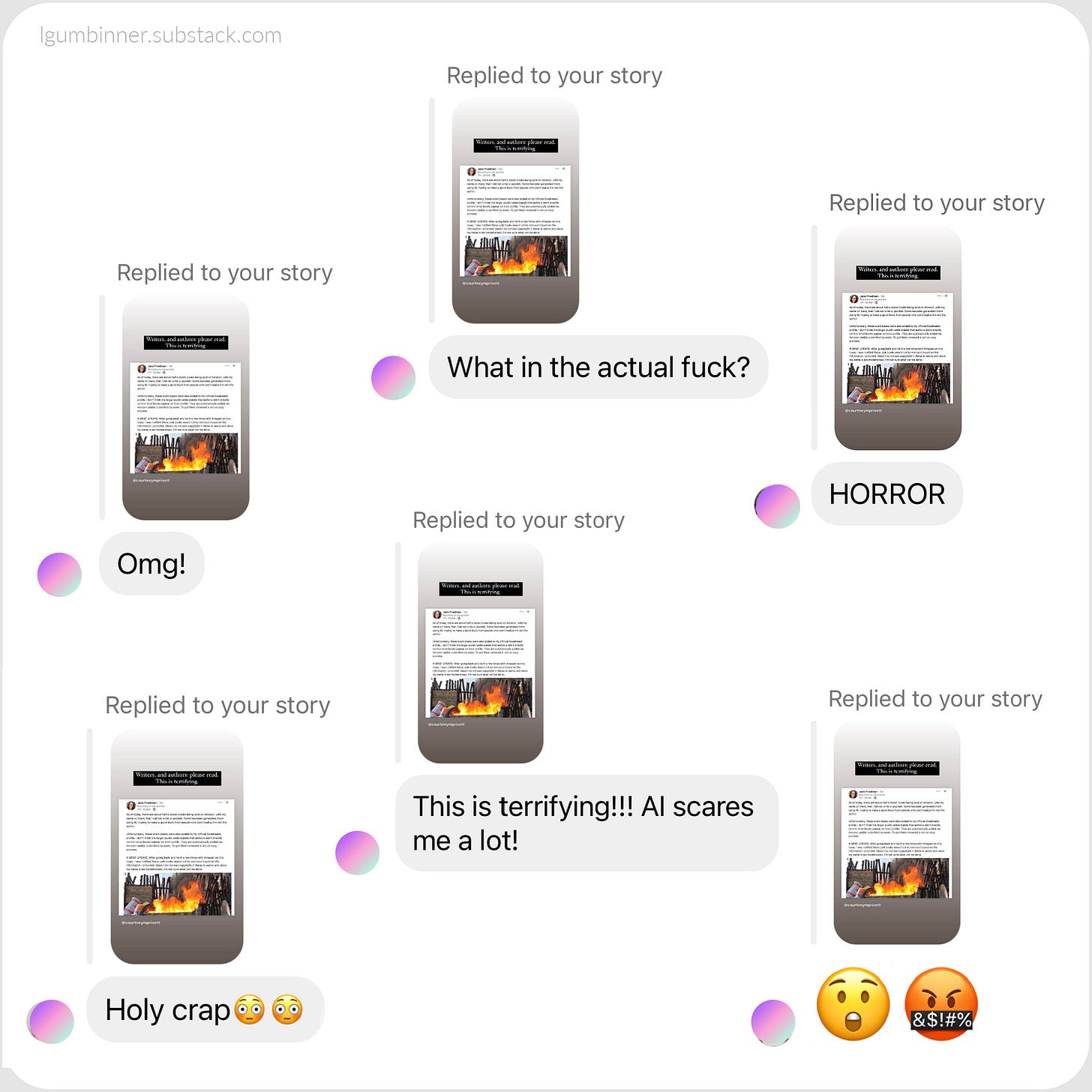How do you know I even wrote this?
Scammers with A.I. tools are now hurting authors. Who comes next?

At risk of sounding like a tech neophyte who still asks how to get my VCR to stop blinking 12:00 (let alone someone old enough to be able to get that reference), A.I. is scaring the fuck out of me.
At first it manifested itself in fairly transparent scammy ways. Like the weekly influx of new Instagram followers with totally real names like John_Billy_USA_0599302, whose feeds contain exactly six totally real photos, all posted on the same day:
- John Billy with dog (he’s nurturing)
- John Billy on yacht (he’s rich)
- John Billy in US army/navy/pilot/firefighter uniform (he’s definitely American)
- John Billy with adorable niece (he loves kids)
- John Billy working out shirtless (he’s sexy)
- John Billy raising a glass of champagne to camera, possibly on or near the yacht (did I mention he’s rich?)
This exciting new addition to your Instagram friend roster may or may not be followed by a poetic DM in exquisite English, the kind that makes your heart skip a beat. Something like hi prety laidey 💕
Report. Block. Delete.
Going back 15 years to my first understanding of Twitter bots and blog comment spam and automated scraping of Cool Mom Picks articles onto ad-packed sites, it was clear we were entering an era of “what is even real?” Now, we’re fully immersed in it.
I don’t like it.
Yes, I know I’m supposed to see the wonderful possibilities in A.I. (I’m trying), and there surely are some. Lots of writers and creative folks I respect are talking about how smart and useful it can be for us, and how we can accept our Artificial Intelligence Overlords or see ourselves become irrelevant; but I can’t help but imagine next season’s Black Mirror premier episode in which a writer building a huge audience by advocating for A.I. gets replaced by A.I., which continues writing more articles in their name about how great A.I. is. In the end, the real writer loses everything in their life, smashes their laptop, and moves off the grid with nothing more than a pencil, a pad, and their dog (they’re nurturing) to find a new life of simplicity.
(© Liz Gumbinner. Don’t steal that, Netflix.)
I’m already worried about the dystopian A.I. future that SAG and the WGA have been fighting against, one in which actors, writers, voice over artists, animators, creators of all kinds are metaphorically strapped to a lab table while the sum total of their knowledge and talent and carefully honed skills are sucked from their brains right into a computer.
Then this week, I learned about a new way in which A.I. is hurting writers, and it strikes even closer to home.
Author Jane Friedman’s story has been floating around for a week, but I received so many Astonished-Face-emoji responses when I shared it in Stories (via Courtney Privet) I figured it was worth sharing here too.

Here’s the post everyone was responding to:
As of today, there are about half a dozen books being sold on Amazon, with my name on them, that I did not write or publish. Some huckster generated them using Al, hoping to make a quick buck from people who don't realize I'm not the author.
Unfortunately, these scam books were also added to my official Goodreads profile. I don’t think the larger public understands that authors don’t directly control what books appear on their profile. They are automatically added via Amazon and/or submitted by users. To get them removed is not an easy process.
A BRIEF UPDATE: After going back and forth a few times with Amazon on this issue, I was notified these junk books would not be removed based on the information I provided. Since I do not own copyright in this AI works and since my name is not trademarked, I’m not sure what can be done.
Jane added more information about her situation on Facebook and FKA Twitter, explaining the scam books were poorly written using A.I. generated text (“one even has a misspelling in the title.”).
She chilled me with her analysis:
“I fear this is just the beginning of a nightmarish world where you can't know for sure who authored the book you've found on Amazon or Goodreads.”
“Nightmarish.”
Absolutely.
Thanks to Jane’s story blowing up, amplified by plenty of media coverage, she was finally able to (mostly) fix the situation. So, huzzah!
But certainly, there will be others.
Seth Kugel and Stephen Hiltner have also written about a massive travel guidebook scam in which “shoddy guidebooks [by fake authors], promoted with deceptive reviews have fooded Amazon in recent months.” (NYT)
Beyond the travel category, they’re seeing the same situation in cookbooks, gardening, crafts, business, and (eep) medicine.

Imagine one day finding your name attached not to some crap book about leadership advice, but a book called Jewish Space Lasers: Here’s the Proof! Or My Dinner With Sackler: Why America’s Greatest Family is Getting a Bad Rap.
Imagine being a respected pediatrician whose name appears on some quack parenting book filled with harmful advice on caring for newborns.
Imagine being a middle-school student who Googles their own name, to find that the first search result is an Amazon listing for a book they never actually authored about something unspeakably horrible and offensive.
Actually no. I’d rather not imagine it.
This rabbit hole leads to some very very dark places.
We of course shouldn’t be completely surprised that there are fake books online. We are all—if we are honest—culpable in creating a market for them.
After all, we have collectively shown a willingness to purchase knock-off everything—handbags, shoes, artwork, earbuds, baby dolls, retro-modern furniture, power tools, kettle corn, enormous squishy stuffed animals, crockpots, leather jackets, designer wristwatches, fanny packs and eyelash growth serum—under the guise of affordability.
This is not said with sanctimony, by the way. Budgets are tight, and we’ve come to rely on those “everyday low prices” and brands like BRYUBR or OVERBRUXPLY on Amazon to help us out.
Our system has made it so easy to accept the knock-offs and cheap but good-enough fakes of the world, that it actually takes extra work now to spot them, let to actively pass on them. It’s not like we’re just walking past a single card table on Canal Street overflowing with just-fell-off-a-truck $45 Coach handbags. Fake everything is everywhere.
So yeah, I’m terrified about what’s going to happen to the writers, photographers, creators who I love and who inspire me, if we get to the point where there’s more incentive for them not to publish online.
And yeah, I’m terrified about the intersection between A.I.’s more nefarious capabilities and a public that seems to remain relatively unconcerned about it.
But I’m also trying to find some optimism here.
Maybe it’s this:
If we helped create a market for fake/fast/cheap everything, we can absolutely take it away.
We have the ability to do the right thing. We can call out the fakes. We can report the bots. We can lift up the truth-tellers. We can right the ship in a “what is even real” world, even if it does take effort.
I don’t believe it’s too late to care about authenticity. I don’t believe it’s too late to care about truth. I don’t think it’s too late to care about storytellers, designers, artists, composers, makers, builders, thinkers, inventors and creators of all kinds—enough so that we ensure they keep creating.




As an attorney, I find it horrifying that my clients will think my education is worthless and they can get a valid legal document through AI. I have recently turned to creative writing as an alternative to my civil practice work, and thinking about how much work I put into my writing as a non published author makes it even worse to imagine these possibilities. It had not occurred to me there would be books added to an author’s profile without their knowledge. Thank you for shedding light on this subject for us.
Remember when 2001: A Space Odyssey was considered science fiction? Remember HAL? Remember when critical thinking had a serious place in education? The future seems frightening, because we are moving at warp speed. It’s only the Truth Tellers like you, the ones who become hoarse from yelling, who we can hope will remind us to be David Bowman. Kubrick would like that.